- Regulatory Status
- RUO
- Other Names
- Colony stimulating factor 2, CSF2, Granulocyte/macrophage colony-stimulating factor, CSF-α, Pluripoietin-α, Eosinophil colony stimulating factor (Eo-CSF), Burst promoting activity (BPA).
- Ave. Rating
- Submit a Review
- Product Citations
- publications
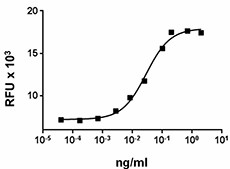
-
Human GM-CSF induces the proliferation of human erythroleukeima TF-1 cells. -

Recombinant human GM-CSF induces the proliferation of human erythroleukemia TF-1 cells in a dose dependent manner. BioLegend’s protein was compared side-by-side to the leading competitor’s equivalent product.
GM-CSF plays a key role in signaling emergency hemopoiesis (predominantly myelopoiesis) in response to infection, including the production of granulocytes and macrophages in the bone marrow and their maintenance, survival, and functional activation at sites of injury or insult. The receptor for GM-CSF is a heterodimer that comprises a major binding subunit (GMRα) and a major signaling subunit (βc). The receptor subunits are always coexpressed on the surface of leukocytes, with βc being expressed at lower levels than GMRα. Certain nonhemopoietic cell types have also been reported to express the GM-CSF receptor and to respond to GM-CSF stimulation in vitro, although the in vivo significance of these observations remains uncertain.
Product DetailsProduct Details
- Source
- Human GM-CSF, amino acids Ala18- Glu144 (Accession# NM_000758) was expressed in E. coli.
- Molecular Mass
- The 127 amino acid N-terminal methionylated recombinant protein has a predicted molecular mass of 14477.5 Da. The DTT-reduced protein migrates at approximately 14 kDa and the non-reduced protein migrates with slightly greater mobility by SDS-PAGE.
- Purity
- >95%, as determined by Coomassie stained SDS-PAGE.
- Formulation
- 0.22 µm filtered protein solution is in PBS.
- Endotoxin Level
- Less than 0.01ng per µg cytokine as determined by the LAL method.
- Concentration
- 10 and 25 µg sizes are bottled at 200 µg/mL. 100 µg size and larger sizes are lot-specific and bottled at the concentration indicated on the vial. To obtain lot-specific concentration and expiration, please enter the lot number in our Certificate of Analysis online tool.
- Storage & Handling
- Unopened vial can be stored between 2°C and 8°C for up to 2 weeks, at -20°C for up to six months, or at -70°C or colder until the expiration date. For maximum results, quick spin vial prior to opening. The protein can be aliquoted and stored at -20°C or colder. Stock solutions can also be prepared at 50 - 100 µg/mL in appropriate sterile buffer, carrier protein such as 0.2 - 1% BSA or HSA can be added when preparing the stock solution. Aliquots can be stored between 2°C and 8°C for up to one week and stored at -20°C or colder for up to 3 months. Avoid repeated freeze/thaw cycles.
- Activity
-
The ED50 = 0.01 – 0.04 ng/mL as determined by the dose-dependent stimulation of TF-1 cell proliferation.
The specific activity of recombinant human GM-CSF is approximately 1.6 x 104 IU/µg when compared against the 1st WHO International Standard for Human GM-CSF (NIBSC code: 88/646).
For more information on specific activity, please visit the Recombinant Protein Unit Conversions page. - Application
-
Bioassay
- Application Notes
-
BioLegend carrier-free recombinant proteins provided in liquid format are shipped on blue-ice. Our comparison testing data indicates that when handled and stored as recommended, the liquid format has equal or better stability and shelf-life compared to commercially available lyophilized proteins after reconstitution. Our liquid proteins are verified in-house to maintain activity after shipping on blue ice and are backed by our 100% satisfaction guarantee. If you have any concerns, contact us at tech@biolegend.com.
- Additional Product Notes
-
View more applications data for this product in our Scientific Poster Library.
-
Application References
(PubMed link indicates BioLegend citation) - Product Citations
-
Antigen Details
- Structure
- Cytokine
- Distribution
-
T cells, macrophages, fibroblasts, endothelial cells, mast cells.
- Function
- Synergistic with IL-1, IL-3, G-CSF; E21R competitive antagonist for receptor binding; stored in ECM with heparan sulfate proteoglycans
- Interaction
- Granulocyte/macrophage/erythroid/megakaryocytic progenitors, myeloblasts, monoblasts, dendritic cells, T cells.
- Ligand/Receptor
- Heterodimer GM-CSFR α subunit (CDw116); β-subunit (CDw131) in common
- Bioactivity
- Granulocyte-macrophage colony-stimulating factor (GM-CSF) and the related cytokines interleukin (IL)-3 and IL-5 regulate the production and functional activation of hemopoietic cells, with GM-CSF acting on monocyte/macrophages and all granulocytes.
- Cell Type
- Embryonic Stem Cells, Hematopoietic stem and progenitors
- Biology Area
- Cell Biology, Stem Cells
- Molecular Family
- Cytokines/Chemokines, Growth Factors
- Antigen References
-
1. Hercus TR, et al. 2009 Blood 114:1289-1298.
2. Hayashida K, et al. 1990 Proc Natl Acad Sci USA. 87:9655-9659.
3. Walker F, et al. 1985 EMBO J 4:933-939.
4. Kitamura T, et al. 1989 J. Cell Physiol. 140:323. - Gene ID
- 1437 View all products for this Gene ID
- UniProt
- View information about GM-CSF on UniProt.org
Related FAQs
- Why choose BioLegend recombinant proteins?
-
• Each lot of product is quality-tested for bioactivity as indicated on the data sheet.
• Greater than 95% Purity or higher, tested on every lot of product.
• 100% Satisfaction Guarantee for quality performance, stability, and consistency.
• Ready-to-use liquid format saves time and reduces challenges associated with reconstitution.
• Bulk and customization available. Contact us.
• Learn more about our Recombinant Proteins. - How does the activity of your recombinant proteins compare to competitors?
-
We quality control each and every lot of recombinant protein. Not only do we check its bioactivity, but we also compare it against other commercially available recombinant proteins. We make sure each recombinant protein’s activity is at least as good as or better than the competition’s. In order to provide you with the best possible product, we ensure that our testing process is rigorous and thorough. If you’re curious and eager to make the switch to BioLegend recombinants, contact your sales representative today!
- What is the specific activity or ED50 of my recombinant protein?
-
The specific activity range of the protein is indicated on the product datasheets. Because the exact activity values on a per unit basis can largely fluctuate depending on a number of factors, including the nature of the assay, cell density, age of cells/passage number, culture media used, and end user technique, the specific activity is best defined as a range and we guarantee the specific activity of all our lots will be within the range indicated on the datasheet. Please note this only applies to recombinants labeled for use in bioassays. ELISA standard recombinant proteins are not recommended for bioassay usage as they are not tested for these applications.
- Have your recombinants been tested for stability?
-
Our testing shows that the recombinant proteins are able to withstand room temperature for a week without losing activity. In addition the recombinant proteins were also found to withstand four cycles of freeze and thaw without losing activity.
- Does specific activity of a recombinant protein vary between lots?
-
Specific activity will vary for each lot and for the type of experiment that is done to validate it, but all passed lots will have activity within the established ED50 range for the product and we guarantee that our products will have lot-to-lot consistency. Please conduct an experiment-specific validation to find the optimal ED50 for your system.
- How do you convert activity as an ED50 in ng/ml to a specific activity in Units/mg?
-
Use formula Specific activity (Units/mg) = 10^6/ ED50 (ng/mL)








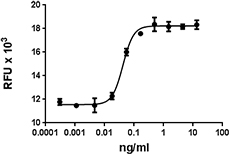
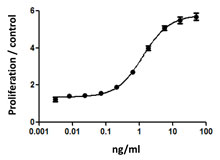
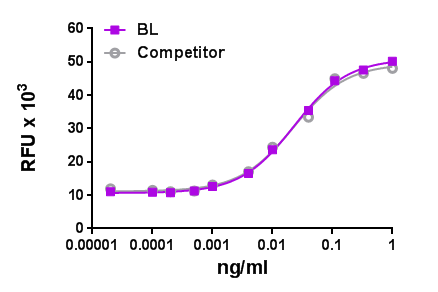
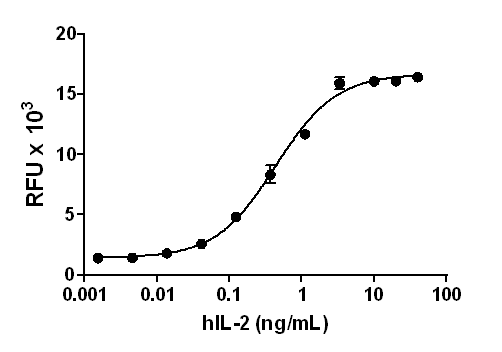



Follow Us